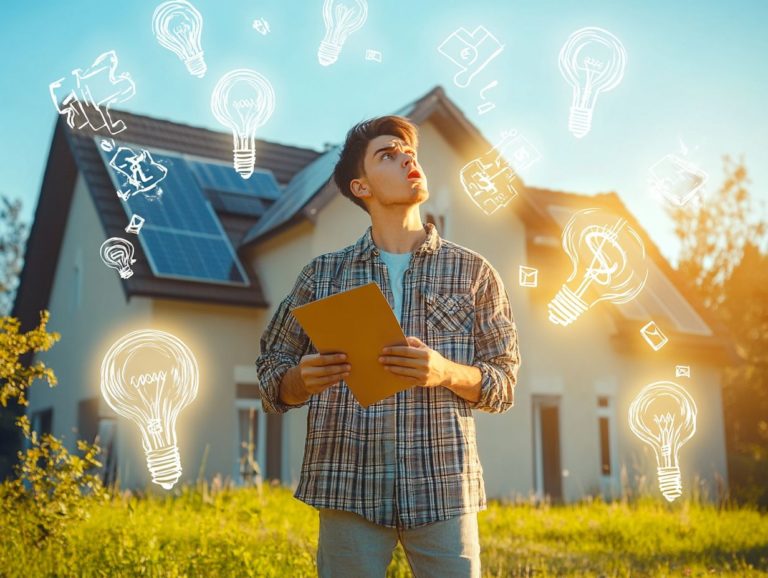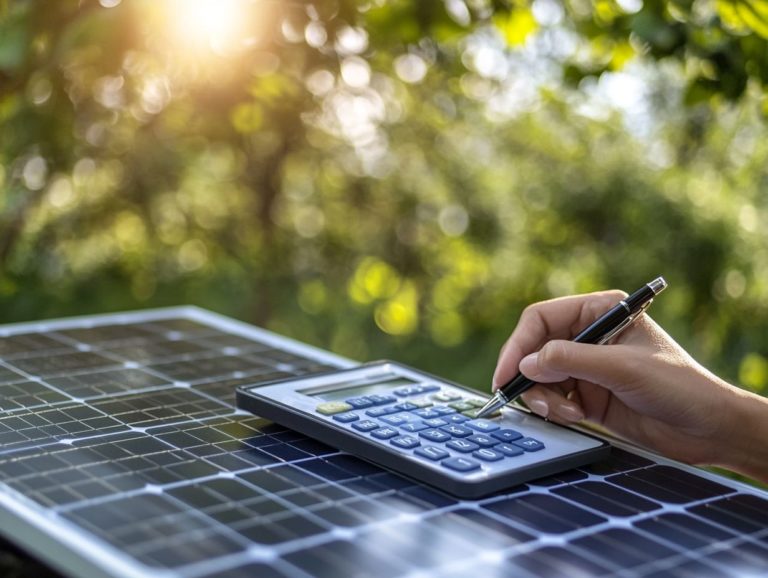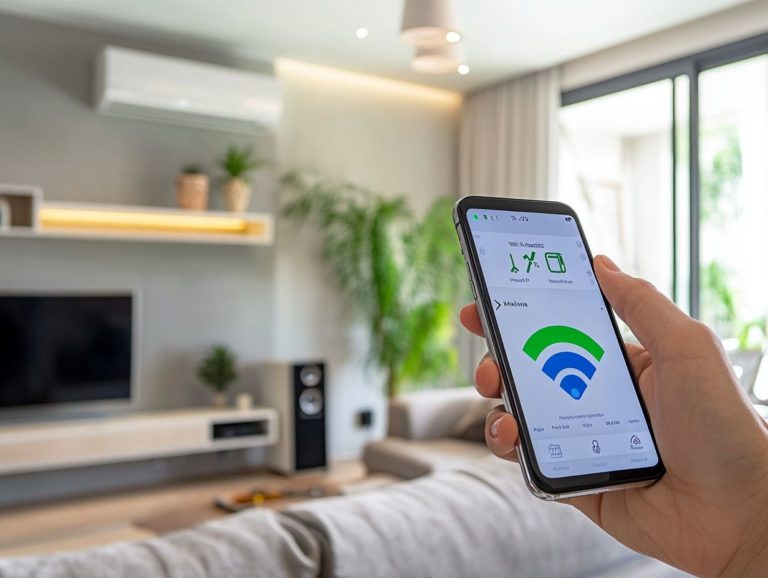What are the Best Energy Saving Tips?
In today’s world, grasping the intricacies of energy consumption is more crucial than ever. With utility bills on the rise and environmental concerns looming large, embracing energy efficiency has become a top priority whether for your home or business. This includes learning how to save money by making smarter choices about energy use.
This article delves into energy use within your spaces, showcasing the myriad benefits of conservation. You’ll discover how saving energy, such as using energy-efficient appliances, can lead to significant cost savings while simultaneously reducing your environmental footprint.
We provide you with practical tips for immediate energy savings, such as learning how to turn things off when not in use and advanced strategies for long-term efficiency. You ll also find the best tools to measure your progress.
Join us on this thrilling journey to save money and protect our planet!
Contents
- Key Takeaways:
- Understanding Energy Consumption
- Benefits of Energy Conservation
- Simple Changes for Energy Savings
- Advanced Strategies for Energy Efficiency
- Creating an Energy-Saving Plan
- Measuring and Tracking Energy Savings
- Frequently Asked Questions
- What are the Best Energy Saving Tips?
- How can I save energy at home?
- What are some easy ways to save energy in the kitchen?
- Is it really worth it to unplug electronics when not in use?
- Do I need to invest in expensive energy-saving appliances?
- Can planting trees really help save energy?
- How can I encourage my workplace to save energy?
Key Takeaways:
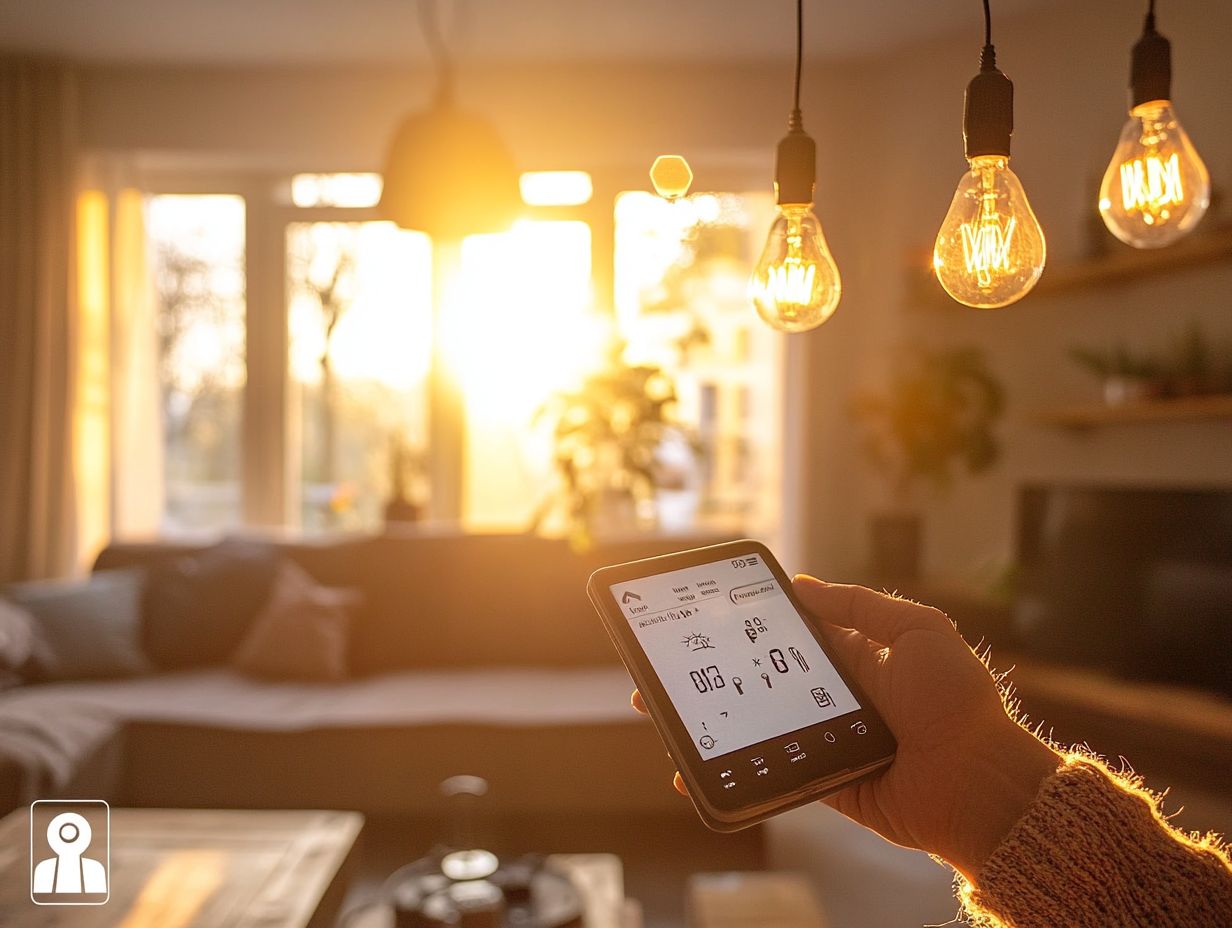
- Understand your energy use to spot savings.
- Small adjustments can lead to big rewards for your wallet and the planet.
- Invest in energy-efficient technology for lasting savings.
Understanding Energy Consumption
Understanding energy consumption is essential for homeowners and business owners who want to lower energy bills. It also promotes environmental sustainability.
By grasping how energy is used in your home or building, you can pinpoint opportunities for energy-saving upgrades and embrace energy-efficient practices.
How Energy is Used in Homes and Buildings
Energy is harnessed in your home and building through various systems, including heating, cooling, lighting, and appliances. Each plays a significant role in overall energy consumption.
Heating and cooling units, in particular, often account for a substantial portion of energy usage. Energy-efficient appliances are essential for minimizing electricity costs, while smart thermostats expertly adjust temperature settings based on occupancy, enhancing your energy conservation efforts.
Efficient lighting systems, such as LED bulbs, consume significantly less power compared to traditional options. It s crucial for both homeowners and businesses to prioritize keeping an eye on your energy use; this practice not only helps identify inefficiencies but also leads to considerable financial savings over time, fostering a more sustainable approach to energy usage.
Benefits of Energy Conservation
The advantages of energy conservation extend far beyond simple cost savings; they play a crucial role in making a significant environmental impact. By embracing energy efficiency, you actively contribute to the fight against climate change while also promoting the use of renewable energy sources and energy-efficient appliances.
Cost Savings and Environmental Impact
By implementing energy conservation measures, you can achieve substantial savings on your energy bill while also making a meaningful contribution to the environment and helping to combat climate change.
When you adopt energy-efficient appliances and practices, you’re not just cutting down on your consumption; you’re actively reducing the demand for electricity generated from fossil fuels.
Embracing renewable power sources like solar panels or wind turbines can elevate these savings even further, allowing you to harness clean energy and lessen your dependence on traditional grid power.
Simple strategies, such as optimizing your heating and cooling systems or enhancing insulation, can lead to lower utility bills and a smaller carbon footprint.
Collectively, these actions foster a healthier planet, reinforcing the vital connection between your individual choices and their broader environmental impact.
Start today by making simple changes that can have a huge impact. Together, we can make a difference!
Simple Changes for Energy Savings
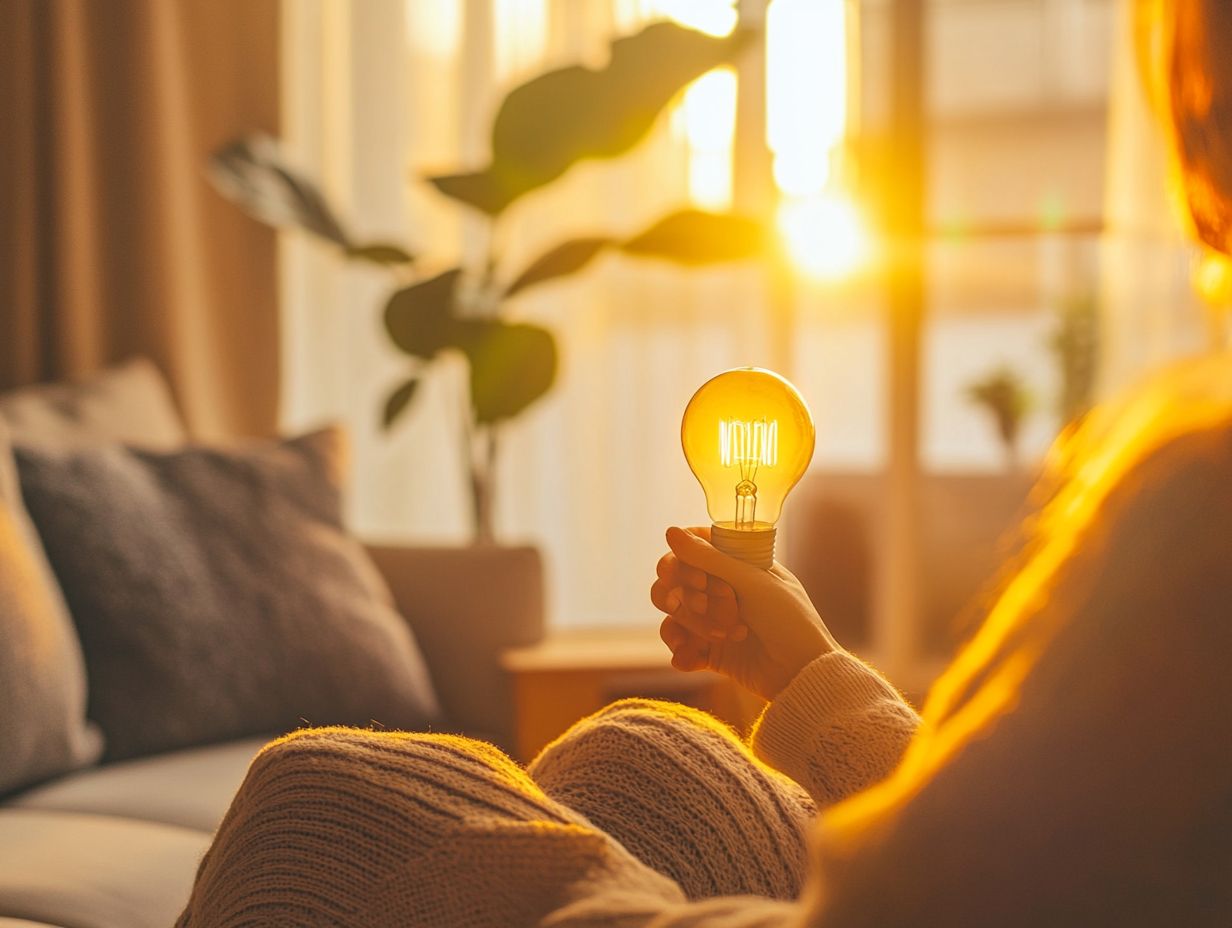
You can achieve substantial energy savings with some simple changes around your home. By implementing practical tips such as turning off devices when they re not in use, switching to LED light bulbs, and utilizing programmable thermostats, you ll notice a significant difference in your energy consumption.
It’s the small adjustments that often yield remarkable results.
Practical Tips for Reducing Energy Usage
To effectively reduce energy usage, you can adopt practical tips like installing low-flow showerheads and ensuring that your washing machine is only used for full loads.
Additionally, recycling electronics responsibly is essential.
By investing in energy-efficient appliances that proudly display the ENERGY STAR label a mark that shows appliances use less energy you can significantly cut down on your power consumption while still enjoying all the modern conveniences you love.
Maximizing utility efficiency is crucial! Seal leaks in doors and windows to keep heat in during winter and cool air in summer.
Using smart power strips eliminates energy used by devices that are turned off but still plugged in, ensuring that energy is not wasted.
Embracing natural light during the day and opting for LED bulbs can also make a substantial difference in lowering your electricity bills.
Advanced Strategies for Energy Efficiency
Advanced strategies for energy efficiency require you to make informed investments and smart upgrades. Consider checking your energy use to identify areas for improvement.
Enhancing your insulation can significantly reduce energy loss, while incorporating smart home devices allows you to optimize energy usage seamlessly. By taking these steps, you elevate your home s efficiency and contribute to a more sustainable future.
Investments and Upgrades for Long-Term Savings
Investing in energy-efficient appliances and making strategic upgrades, such as installing smart thermostats and enhancing your home s insulation, can lead to substantial long-term savings on your energy bills.
These enhancements not only significantly reduce your electricity consumption but also contribute to a lower carbon footprint, aligning perfectly with broader sustainability goals. For instance, energy-efficient appliances like high-efficiency washing machines drastically decrease energy use while still delivering top-notch performance.
By implementing smart thermostats, you can optimize your heating and cooling systems, adjusting temperatures based on occupancy and personal preferences. By prioritizing these investments, you ll enjoy a remarkable return on investment over time, ultimately benefiting both the environment and your household finances.
Creating an Energy-Saving Plan
Want to save energy? Start with a solid plan! Conduct an energy audit to discover where you can improve.
Steps for Implementing Energy-Saving Measures
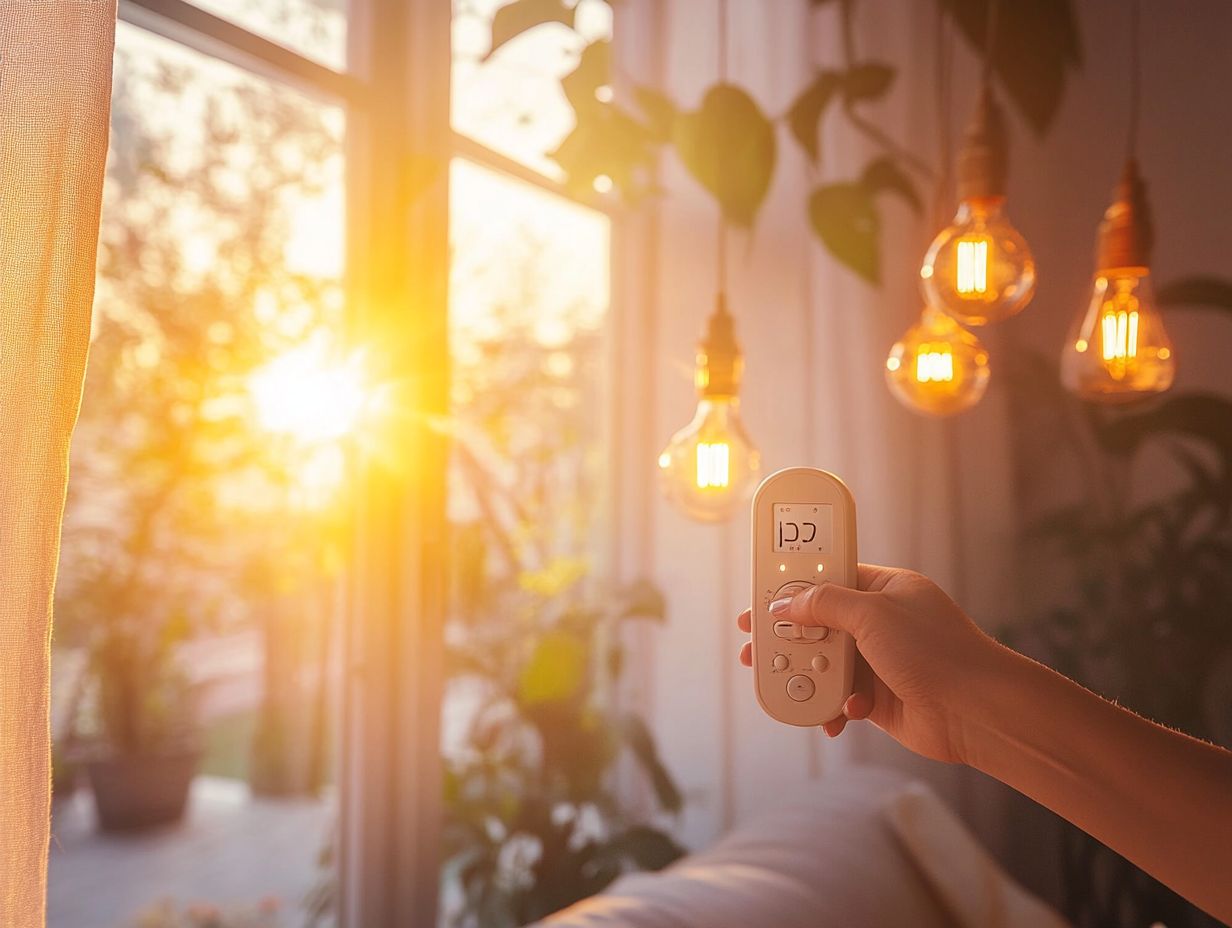
Implementing energy-saving measures requires a systematic approach, starting with an energy audit and progressing to the installation of smart power strips and optimizing your heating and cooling systems.
To embark on your journey toward a more energy-efficient home, begin with a thorough energy audit. This essential step helps you pinpoint areas where energy is being squandered. Once the audit is complete, you’ll be empowered to make informed decisions on how to implement the top energy-saving tips for homeowners to enhance efficiency.
The next step is to install smart power strips, which cleverly cut off power to devices that aren’t in use, reducing energy used by devices that are turned off but still plugged in. You can also make adjustments to your heating and cooling systems by installing programmable thermostats and sealing ducts, ensuring these systems run at their best. For more ideas, check out maximizing energy efficiency.
Together, these measures will pave the way for substantial reductions in energy consumption, translating into cost savings and a smaller environmental footprint.
Measuring and Tracking Energy Savings
Discover how measuring your energy use can lead to significant savings! Measuring and tracking energy savings is crucial for homeowners to assess the effectiveness of energy-efficient appliances and practices, including using the Kill A Watt Meter to track consumption levels.
By utilizing tools like monitor meters, you can gain valuable insights into your energy consumption and ensure that your efforts are truly making a difference.
Tools and Methods for Monitoring Energy Usage
Tools like the Kill A Watt Meter empower you to monitor your energy usage. This allows you to evaluate your energy-efficient appliances and uncover potential savings.
These devices provide real-time data, helping you identify which appliances are the biggest electricity hogs. This way, you can make informed decisions about upgrades or replacements.
Beyond just meters, smart plugs and energy monitoring systems elevate your understanding by tracking usage patterns over time.
Energy audits often use these tools to assess overall efficiency, revealing areas where energy waste may be lurking in your home or business.
By incorporating practical measurement techniques like infrared thermography (which detects heat loss) or blower door tests (which measure air leaks), you can gain a comprehensive overview that aids in effectively strategizing your energy management.
Watch this video for more tips on energy savings.
Frequently Asked Questions
What are the Best Energy Saving Tips?
There are many energy-saving tips out there, but here are the top 6 that will make a big impact: buy smarter, use energy-efficient light bulbs, and consider energy upgrades to reduce your energy bill.
How can I save energy at home?

To save energy at home, make sure to turn off lights and electronics when not in use, use energy-efficient light bulbs, and set your thermostat a few degrees lower.
What are some easy ways to save energy in the kitchen?
To save energy in the kitchen, run the dishwasher only when full, use a slow cooker instead of the oven, and keep the refrigerator door closed as much as possible.
Is it really worth it to unplug electronics when not in use?
Yes, it is worth it to unplug electronics when not in use. Even when turned off, they still draw a small amount of energy, known as standby or vampire power.
Do I need to invest in expensive energy-saving appliances?
While energy-saving appliances can make a big difference in the long run, there are plenty of low-cost or even free ways to save energy, such as unplugging electronics and adjusting your thermostat.
Can planting trees really help save energy?
Yes, planting trees can help save energy. Trees provide natural shade and can reduce the need for air conditioning in the summer months, while also acting as a windbreak and insulator in the winter months. Planting trees today can mean saving energy tomorrow.
How can I encourage my workplace to save energy?
You can encourage your workplace to save energy by suggesting energy-saving initiatives, such as turning off lights in unused areas and implementing a recycling program for paper and plastic products, including recycling electronics.
Start implementing these tips today and watch your energy bill drop!


